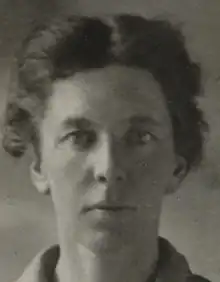Helena Deneke
Helena Clara Deneke (1878–1973) was a British Germanist at Oxford University. She was an enthusiast for women's suffrage and for the Women's Institutes. She was "something of a legend in the Oxford of her day".[1]

Life
Helena Deneke was born in London on 19 May 1878, the oldest child of Philip Maurice Deneke (1842–1925), a German-born London merchant banker, and Clara Sophia Overweg (1847–1933), of a landed Westphalian family.[2] She was educated privately and at St Hugh's Hall, Oxford,[3] where she befriended Grace Hadow, a fellow English student at Somerville College. Deneke gained a first in English in 1903. She became librarian of St Hugh's in 1904, initially teaching English, though switching to become tutor in German in 1909.[2]
Deneke was active within the Oxford Women Students' Society for Women's Suffrage (OWSSWS), established in 1911 with Hadow as President. Deneke and Hadow joined the 1913 Great Pilgrimage for women's suffrage, and Deneke served as OWSSWS Secretary in 1914-15.[4]
In 1913 she moved to Lady Margaret Hall as bursar and German tutor. She and her sister, the pianist Margaret Deneke, lived in a house, Gunfield, next to the college. The pair held highly regarded musical soirees at Gunfield,[3] attended by guests including Albert Einstein and Albert Schweitzer.[5]
Deneke was Treasurer of the National Union of Women's Suffrage Societies until 1919, after which she threw her energies into establishing an Oxford Federation of Women's Institutes. In 1926 she was elected a Lady Margaret Hall fellow. Retiring from the college in 1938, she continued as lecturer to St Anne's College until 1942.[3]
As a result of her WI activity, Deneke and Betty Norris of the Townswomen's Guild were invited to play a political role in reconstructing women's organizations in post-war Germany.[1] Deneke visited Germany seven times as a Visiting Expert in women's affairs, "making contact with nearly all German women of importance in German life".[6] Their report, published in 1947, emphasised Deneke's hopes for Landfrauenvereine analogous to English WIs, and German women's immediate need for practical material aid rather than 'preaching' of democracy.[1]
Helena Deneke died in Oxfordshire on 26 September 1973.[2] Her manuscript memoirs and personal papers are held at Lady Margaret Hall.[7]
Works
- 'Goethe's mind and art', Hibbert Journal, Vol. XXX (July 1932), pp. 626–637
- 'Some observations on Jean Paul', in German studies presented to Professor H.G. Fiedler, M.V.O., by pupils, colleagues, and friends on his seventy-fifth birthday. Oxford: Clarendon Press, 1938.
- Grace Hadow. Oxford: Oxford University Press, 1946.
- (with Betty Norris) The Women of Germany. London: The National Council of Social Service, 1947
References
- David Phillips (2015). "Helena Deneke and the women of Germany: a note on post-war educational reconstruction". Investigating Education in Germany: Historical studies from a British perspective. Routledge. pp. 138–154. ISBN 978-1-317-52438-0.
- D. Phillips, Deneke, Helena Clara, Oxford Dictionary of National Biography, 2004. Accessed 6 January 2020.
- 'Miss H. C. Deneke', The Times, 1 October 1973.
- Mavis Curtis (2015). The WI: A Centenary History. Amberley Publishing Limited. pp. 35–6. ISBN 978-1-4456-1704-6.
- Mavis Curtis (2015). The WI: A Centenary History. Amberley Publishing Limited. pp. 78–9. ISBN 978-1-4456-1704-6.
- Denise Tscharntke (2003). Re-Educating German Women: The Work of the Women's Affairs Section of British Military Government 1946-1951. P. Lang. p. 17. ISBN 978-0-8204-6480-0.
- The papers of Helena and Margaret Deneke, Lady Margaret Hall. Accessed 6 January 2020.